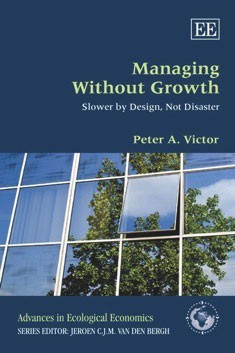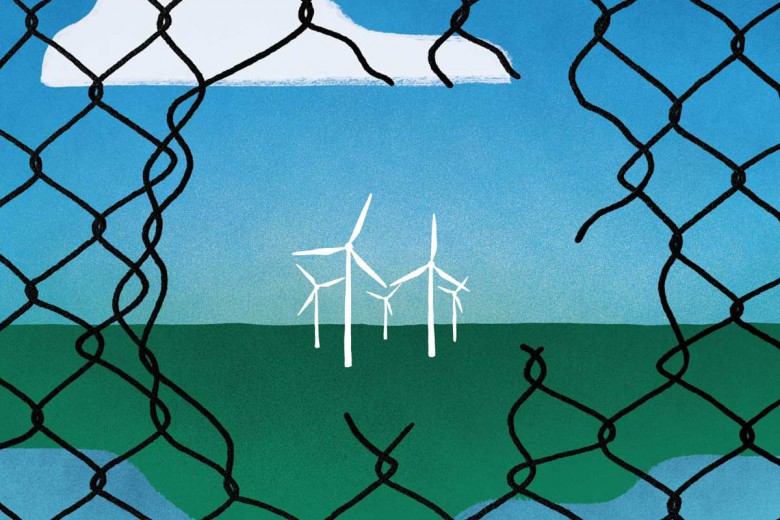
Managing Without Growth: Slower by Design, Not Disaster
By Peter Victor
Edward Elgar, 2008
The world economic crisis has nations around the globe in panic mode, working feverishly to get their economies growing again. But as Peter Victor suggests in his book Managing Without Growth: Slower by Design, Not Disaster, citizens of the richer nations may actually be better off if they stop trying to grow their economies.
This idea is anathema to the majority of politicians, and to the public. Most of us now implicitly agree that we should not take actions that are “bad for the economy, bad for competitiveness, bad for trade: that is, bad for growth.” Victor, however, argues that economic growth in the rich nations should not and cannot continue.
First, economic growth cannot continue indefinitely because we live on a finite planet. As Victor points out, the non-renewable energy resources that fuel our economy, like oil and natural gas, are limited and are being fast depleted. Our renewable resources are also being used up. Overfishing has caused drastic declines in almost every species of fish, habitat loss is causing species to go extinct at a rate one thousand times higher than historical levels, and forests are being lost from overharvesting. Economic growth depends on using more resources to produce more goods and services. Growth cannot continue if our resources run out.
Victor also reminds us that climate change can be directly tied to economic growth. The coal plants that fuel our growing electric grids, the gasoline that we use to transport increasing quantities of goods across the planet, and the natural gas we use to heat our ever bigger homes all release greenhouse gas emissions. Victor suggests that it will be very difficult to stop our greenhouse gas emissions from rising if we keep increasing the size of our economy.
Apart from making the case that growth cannot continue, Victor also questions whether more growth is actually desirable. Economic growth has failed to guarantee full employment and has failed to end poverty, even in the rich nations. The link between happiness and economic growth is also tenuous as more of us consume “defensively,” using our growing incomes to buy goods that are designed to increase or maintain our status, rather than buying goods designed to meet our needs.
This is not to say that all global citizens are in this position. Victor recognizes the need for economic growth to alleviate the grinding poverty in places like sub-Saharan Africa. However, Victor argues that growth in poor nations won’t occur if the rich nations keep using up all of the energy and material resources. As he writes, “the biophysical limits of the planet will prevent the kind of economic growth enjoyed by rich countries from being extended to all peoples of the world over the long term.” If we want to end poverty globally, the rich nations must stop growing their economies.
Victor’s book stands in contrast to books like The Skeptical Environmentalist by Bjorn Lomborg, and B.M. Friedman’s The Moral Consequences of Economic Growth. These authors believe that continued economic growth is both possible and desirable. They argue that technological progress will allow the human species to overcome any constraints to growth posed by scarce resources, scarce pollution sinks or the loss of healthy ecosystems. Victor cautions against this “blind faith” in the ability of technology to solve all of our problems. He points out that ideas can be considered technologies. The emerging idea that rich countries have outgrown the need for further growth may be precisely the technology that we need most.
Managing Without Growth offers a compelling argument for the need for a new policy focus in the rich nations. Peter Victor argues that it is time for our obsession with economic growth to end. A new focus on human well-being must replace our “more is better” philosophy. This new focus will be accompanied by policies like shortened work weeks, cap-and-trade systems for allocating resources and increased aid for poor nations. We have lived too long with “an unduly narrow interpretation of the meaning of progress.” We can act now to slow down our economy by design, not disaster.






